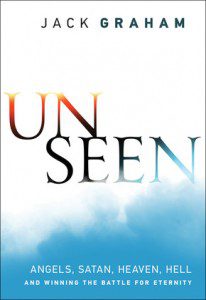 Jack Graham’s Unseen: Angels, Satan, Heaven, Hell, and Winning the War for Eternity is a must-read for anyone who wishes to learn about traditional images of the afterlife and the spiritual world. Although I take a very different theological and biblical bath, Graham well represents a literalist understanding of scripture, and that in itself is worth the read, purely to gain awareness of a certain type of Christian thinking. I use the term “certain type of Christian thinking,” because neither scripture nor tradition are as monolithic as some, including Graham, think. There have been historically and biblically a variety of Christian understandings of the afterlife, each justifiable from its own perspective. Like most literalist readings, Graham’s work avoids nuance, serious theological questioning, wrestling with the many biblical voices, and the insights of contemporary contextual biblical scholarship. His clarity is breathtaking: if the Bible (somewhere) says it, we must follow it. The clarity of Unseen about the spiritual world is its strong point, but it also raises numerous questions, especially in relationship to Graham’s vision of Hell.
Jack Graham’s Unseen: Angels, Satan, Heaven, Hell, and Winning the War for Eternity is a must-read for anyone who wishes to learn about traditional images of the afterlife and the spiritual world. Although I take a very different theological and biblical bath, Graham well represents a literalist understanding of scripture, and that in itself is worth the read, purely to gain awareness of a certain type of Christian thinking. I use the term “certain type of Christian thinking,” because neither scripture nor tradition are as monolithic as some, including Graham, think. There have been historically and biblically a variety of Christian understandings of the afterlife, each justifiable from its own perspective. Like most literalist readings, Graham’s work avoids nuance, serious theological questioning, wrestling with the many biblical voices, and the insights of contemporary contextual biblical scholarship. His clarity is breathtaking: if the Bible (somewhere) says it, we must follow it. The clarity of Unseen about the spiritual world is its strong point, but it also raises numerous questions, especially in relationship to Graham’s vision of Hell.
According to Graham, studies note that the majority of people believe in the existence of Hell, but virtually none of them see themselves as going there. In their minds, it’s clear that Osama bin Laden will be there, but with all their imperfections, they see themselves and their children going to Heaven, regardless of their explicit relationship to Christ. Graham sees this as a problem and it is. The question raised by this disparity is: Is the problem with people’s fuzzy and conflicting beliefs about the afterlife? Or, is the problem raised by the vagueness – and corresponding clarity- in some peoples’ minds regarding the notion of Hell itself? I am not sure a “back to the Bible” approach will work, since the Bible itself not only has different perspectives on the afterlife, including the possibility that there is no afterlife at all.
The literalist Christian viewpoint is that unless you accept Jesus Christ as Lord and Savior you will be going to hell. This leads to some interesting issues: I once had a conversation with a college student who stated without equivocation, “My parents are good people, but they aren’t Christians. If they don’t accept Jesus, they are going to hell along with Gandhi, Mohammed, and Buddha.” Now every teenager wants to tell their parents to “go to hell” on occasion but this youngster took this literally!
Hell raises questions, that create a variety of footnotes or exceptions even among literalists, who often speak as if the nature of the afterlife is solely an issue of saved and unsaved, with clearly demarcated pathways to find salvation. Here are a few questions I’ve heard over the years, based on comments by Biblical literalists seeking to open the gates of heaven to a select few, based on their unique situation:
- Hell becomes an issue for us only when you reach the “age of accountability.” Infants are saved, if they die prematurely. But, what constitutes the age of accountability and how do we know? How old or mature do you need to be to an object of God’s wrath? To say, “this is for God to decide,” dodges any reasonable understanding of faith.
- Persons with severe learning disabilities do not need to make an intellectual affirmation of Jesus as Lord, some literalists assert; but again, what is the intellectual dividing line? What is the IQ level beyond which you are subject to condemnation?
- While many see non-Christians, who have never heard the message of Christ as receiving an intellectual pass, the criteria of their salvation is ethical – to be determined by whether or not they align themselves with God’s truths revealed to natural reason? But, couldn’t this also apply to North Americans who hear the message in distorted ways, greatly misunderstand the gospel, or come from “Christian” families in which they are beaten or sexually abused? Do they also receive a confessional pass, being judged only by how they respond to God’s moral presence in nature?
- What constitutes accepting Christ as your Savior? At one time, the unbaptized were Hell-bound. Others saw excommunication and being barred from the sacraments as putting one’s soul in jeopardy. Still others saw dying apart from confession and absolution as a sure sign of damnation.
- Continuing the question of requirements for salvation: What words are necessary to be saved and is there a time limit for making a profession of faith? What is the efficacy of a death bed confession? Does a death bed confession overcome a lifetime of evil action? (for example, Hitler or Pol Pot)
- What about the moral calculus? Does a mass murderer, sociopath, terrorist, and ruthless tyrant find salvation by accepting Jesus, while a loving agnostic experience eternal condemnation as a result of doubt?
- If people who grow up outside the Christian orbit can find salvation by following the wisdom of God in nature, are we doing them any favors by sharing the good news of Jesus? Our missionary work puts their souls in jeopardy, especially if they hear it in unfamiliar or paternalistic ways or see Christianity identified with North American imperialism? Wouldn’t it be more Christ-like to leave them alone?
There are more questions:
- Does the scripture only give one account of the pathway to salvation? There are also universalist and ethical visions the afterlife in scripture, that do not rely on a specific affirmation of Jesus as Lord and Savior.
- Free will is emphasized in our choice for or against God, but how free are we? Our environment can turn us toward or away from God. Family of origin, presentation of scripture, or the moral state of the church shape our attitudes toward Jesus in significant ways?
- Where do psychological issues fit in? Do persons who commit suicide receive a special grace? In previous eras, it was assumed that they were lost forever, having committed the unpardonable sin? This issues was recently raised in response to the suicide of Rick Warren’s son Matthew. Literalist as well as medieval Roman Catholic theology are sure that suicide leads to damnation. But, is this the only response that comes from theology or the biblical tradition? (I, for one, believe that Matthew Warren is in God’s hands – nothing can separate us from the love of God.)
- How does free will square with the notion of omnipotence or omniscience? If God determines all things and/or knows everything in advance, is our free will and quest for salvation an illusion?
Moral and theological issues:
- Can we really affirm with any sense of morality an infinite punishment for finite crimes, everlasting hell for the sins and unbelief of our short lifespan? What does this say about divine compassion and morality? Is God graceful or a hanging judge?
- The reality of Hell points out the powerlessness of God: God either does not or cannot reprieve the sinner. God’s justice limits God’s love; God’s wrath limits God’s love. Is death stronger than God? Is God prohibited from seeking our wholeness by our deaths?
- Heaven-hell images make God out to be borderline or narcissistic: God must be praised or believed or God will reject you. God loves you until you exercise freedom of thought and take a path different from what God intended. Is God’s love so brittle that God can’t deal with rejection?
- Does the dichotomy of heaven-hell fit with the message of Jesus? Jesus did not demand belief to love or heal others. Jesus accepted those deemed unacceptable. Jesus’ hospitality embraced marginalized and outcasts. Shouldn’t God be as loving as Jesus?
While we cannot fully intuit heaven – or hell, if it exists, I think we have to question theological absolutes. My own sense is that the afterlife involves sanctification, or spiritual evolution, for all of us. We must in the process deal with our life history, we must experience God’s healing touch, as well as learn to forgive and be forgiven. Eventually every lost sheep will come home and Christ will be all in all.
Fore more conversation on Unseen, visit the Patheos Book Club here.













